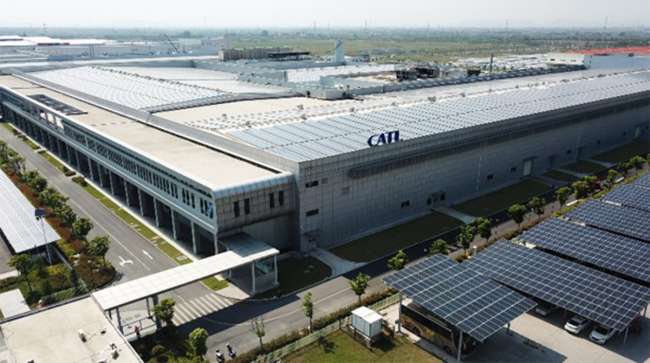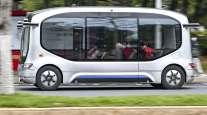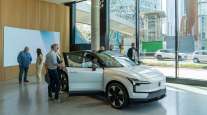Bloomberg News
After EVs, China’s CATL Seeks to Dominate Electric Trucks

[Stay on top of transportation news: Get TTNews in your inbox.]
Contemporary Amperex Technology Co. Ltd. has in a short space of time become the world’s largest maker of electric car batteries. Now the Chinese company wants to dominate in trucks globally, copying the success seen in its home market.
CATL is unveiling new technologies and products for heavy-duty vehicles and ships, including a battery with a 15-year and 2.8 million-kilometer life span, at the IAA Transportation event in Hanover, Germany, on Sept. 16.
The company’s already partnering with several European manufacturers, including Daimler Truck Holding AG, Volkswagen Commercial Vehicles and Volvo A/B, said Akin Li, executive president of the battery maker’s overseas business. It’s involved in early-stage product design as well as research on the infrastructure needed for broader adoption of electrified commercial transport, said Li in an interview with Bloomberg News.
CATL is expanding its commercial-vehicle battery business in Europe as the continent moves to slash carbon emissions from trucks, buses and ships. Europe is aiming to reduce CO2 emissions from heavy-duty vehicles by 45% by the end of the decade, yet technologies to make the shift have been slow to take hold.
Catch the overview of our Commercial Vehicle Battery Brand and New Product Launch at IAA TRANSPORTATION 2024! Discover our latest advancements, CATL Tectrans, set to transform the industry. Watch the recap now and stay ahead of the curve in battery technology.#CATL #BatteryTech… pic.twitter.com/n0gGSeclt3 — CATL (@catl_official) September 16, 2024
In April, the European Automobile Manufacturers’ Association called on Brussels to address a lack of infrastructure for electric transport, saying the continent needs at least 50,000 publicly accessible chargers to achieve the target.
Part of CATL’s plan is to build battery-swapping stations, allowing drivers to replace a depleted cell with a charged one at designated locations. That strategy would help lower the initial cost for operators, as they can lease the battery, but it could take years to tackle the technological and business challenges to build and maintain the infrastructure in Europe.
An earlier attempt by Chinese EV startup Nio Inc. showed the challenges of building battery-swap businesses in Europe. Nio, which has set up over 2,480 of these stations in China, faced a huge delay in its original plan to build 20 stations in Norway.
Port areas could be the earliest adopters of battery-swap stations, Li said, adding that CATL is in discussions with shipping giant CMA CGM about building green ports.
CMA CGM ranks No. 7 on the Transport Topics list of top global freight companies..
Want more news? Listen to today's daily briefing above or go here for more info
Li said it’s “definitely cheaper” to use batteries exported from China, given the maturity of the supply chain there, but the company could ramp up production in Europe based on clients’ needs and other local-production requirements. It already has a plant in Germany, which kicked off production in 2022, and it’s building another in Hungary.
The company has been forced to come up with innovative ways to confront trade uncertainties with Europe and the U.S. Its deal with Ford Motor Co., for example, opens the door to future partnerships where CATL can license the technologies, provide services from factory design to operations, and collect royalty fees, while the U.S. automaker owns 100% of the plant.
Last week, Bloomberg reported that General Motors Co. is in discussions to buy electric vehicle batteries that would use CATL’s technology and be assembled at a new plant in the U.S., funded and operated by Japanese company TDK Corp..
More automakers from the U.S. and Europe are discussing potential partnerships with CATL, including both established manufacturers and startups, Li said.




